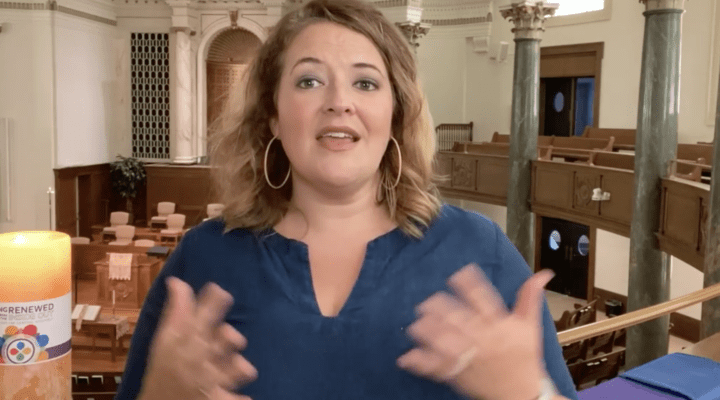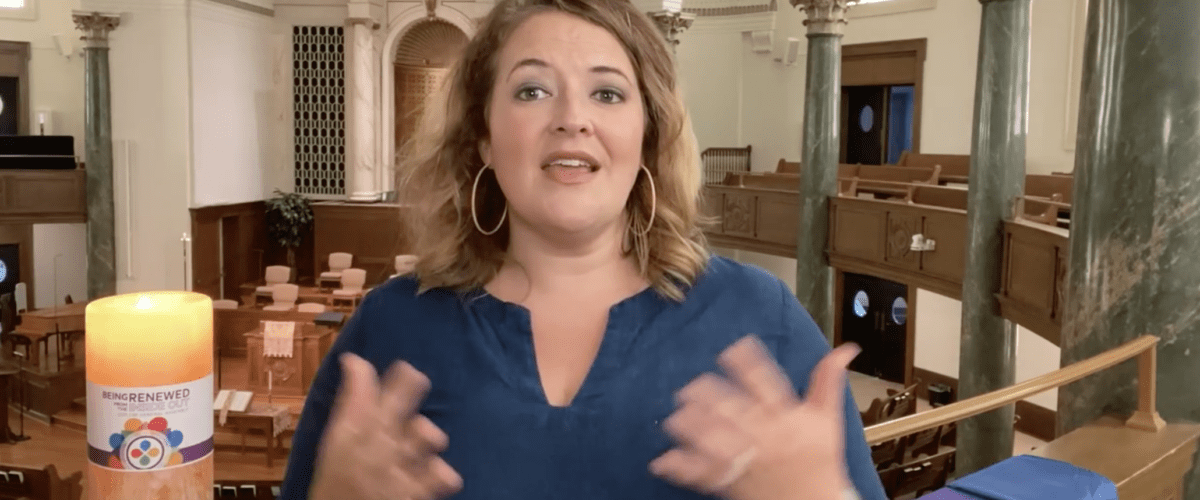Faced with concurrent pandemics of health, politics and racism, Cooperative Baptist Fellowship churches have not lost heart but have pressed on amid the challenges, CBF Executive Coordinator Paul Baxley said in an address to the group’s General Assembly Aug. 27.
Baxley spoke at a Friday morning business session during the annual gathering that, for the second year, was held virtually rather than in person due to the threat of COVID-19.
His message was echoed later that day in the closing session, where Emily Hull McGee spoke about Jesus’ parables of seed and soil and shade.
Seed, soil and shade
McGee, pastor of First Baptist Church on Fifth in Winston-Salem, N.C., told stories of how trees are nurtured by soil that is properly tended. She wove those accounts with the biblical parables of soil and seeds, particularly Jesus’ parable of the mustard seed.
That parable, in particular, she said, “doesn’t promise success.” Instead, “the parable seems to encourage us with the reminder that God’s kingdom comes in due time.”
Biblical stories about seeds and soil, just as our knowledge of how trees grow, teaches that “the mystery of transformation takes place in the soil,” she said.
“The mystery of transformation takes place in the soil.”
McGee urged her listeners to consider the soil work they and their churches have been doing over the year and half when it often feels like “ministry” has been shut down. That work has included keeping vigil with the dying, marching with the oppressed, and caring for the vulnerable, she said.
In this season of death and life, beginning and endings, Christians and their churches have become “fertile ground for renewal,” she declared. “For like the soil beneath your feet, you contain multitudes.”
Yet all churches are vulnerable right now due to the strains of the three pandemics Baxley mentioned. McGee said the natural response of the church would be to respond with more activities, more ministries, more efforts. But that is an anxious response, she asserted.
“The world doesn’t need an anxious church. What gift might a vulnerable church give to our cities? … What life might a humble church bring to the communities we love?”
This unusual season of life “invites us and our churches to renewal from the ground up, renewal that comes with remembering and tending,” she said.
Not losing hope
In his earlier message, Baxley drew upon a text from 2 Corinthians where the Apostle Paul wrote about a difficult season of his life.
“If you read all the correspondence between Paul and the church at Corinth, you see the intensity and the stress and the anger and the tumult that characterized this season in Paul’s life,” Baxley said. “No wonder only a few verses earlier Paul would say that he was perplexed, that he was afflicted, that he was struck down.”
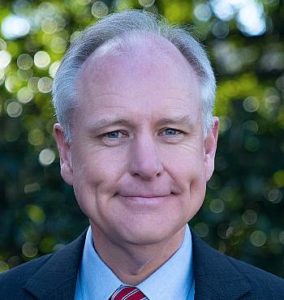
Paul Baxley
Cooperative Baptists likely feel that same way after nearly two years of battering from multiple pandemics, he added. “This morning, my sisters and brothers in Christ across our Cooperative Baptist Fellowship family in the United States and around the world, I’ve come to you today with a question: Is it possible that amidst all the change and challenge we have been facing for this last year and a half, and that we are still facing today, that the Holy Spirit might be renewing us in such a way that we could stand with one voice and join the Apostle Paul in declaring with resilient resurrection confidence that we do not lose heart?”
He acknowledged that “the partisanship of this moment is further straining the fabric of the common life of our congregations” and that pastors are struggling to lead through multiple pandemics. “As the pandemic of partisanship coincides with the health pandemic, we know what it is to feel perplexed, we know what it is to be driven to despair, we know what it is to want to cry with the psalmist, ‘How long, O Lord?’”
He acknowledged the pandemic of unresolved racial injustice “that has plagued this land for more than 400 years” and that has worsened the outcomes of the health pandemic.
Amid all these challenges, Baxley said he joins Paul in not losing heart because he sees evidence in CBF churches of Holy Spirit renewal day by day. “The Holy Spirit is meeting us in this time of great adversity, drawing us close and offering us healing when we feel traumatized, drawing us together in a community so that we are not left alone, giving us a word to speak and a song to sing and a life to live and renewing us to do so with new purpose and fervor and direction.”
“The Holy Spirit is meeting us in this time of great adversity, drawing us close and offering us healing when we feel traumatized.”
He commended CBF churches that have “responded to these unprecedented challenges with agility and ingenuity and perseverance, finding new ways to gather for worship and new ways to serve their communities and new ways to care for the sick.”
And he commended CBF pastors “who stood with risk-taking courage and preached the truth that welled up deep in their souls that they could not keep in even though speaking the gospel in this kind of time is risk taking and challenging.”
He commended worship leaders who “have found new ways for God’s people to sing the Lord’s song in this strange land” and “congregations that have found new ways to bear witness to the love of Jesus Christ that will not let us go.”
He commended CBF Global Missions field personnel, chaplains and others who “have inspired me with their commitment and renewed my own faith by their faithfulness, demonstrated remarkable agility and a willingness to work in new ways and serve in new ways and help us see more clearly our unique opportunities to extend the ministry of this fellowship.”
Significant days ahead
There are more significant days of ministry yet to come, Baxley said, drawing a tie to this being the 30th anniversary year of CBF’s founding.
Strength for that journey may be found in the organization’s very name, he suggested. “As I see it, you who chose the name ‘fellowship’ got it right because, you see, while in our contemporary world fellowship is often reduced to a word we use to describe a potluck meal after worship or a room in some of our congregational structures, the New Testament has a much higher view of what fellowship is in places like Philippians and First John. The New Testament uses the word koinonia to describe fellowship, and what that word really means as First John says in the first chapter is community with the triune God and community with one another.”
What the world needs most right now “is not another convention, not another conference, not on another action committee,” he said. “What the world most needs right now is a community of Christians” that embodies relationship with God and community, binding the two together.
Other business
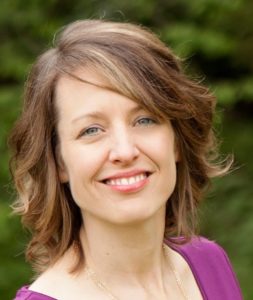
Carol McEntyre
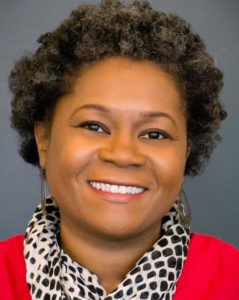
Patricia Wilson
At the conclusion of this year’s assembly, Carol McEntyre concluded her service as moderator and became past moderator. Patricia Wilson, Baylor University law professor and lay leader from Waco, Texas, moved from her position as moderator-elect to the role of moderator.
Also at this year’s assembly, a third woman was elected moderator-elect, setting up an unprecedented three-year span of the national organization being led by women.
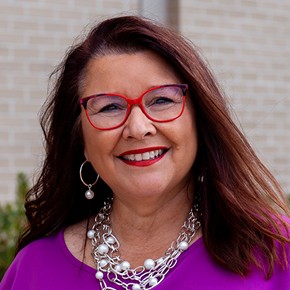
Debbie McDaniel
The new moderator-elect is Debbie McDaniel, a lay leader at First Baptist Church of Huntsville, Ala. She has been active in CBF life for many years at the national and state levels, most recently serving five years on the CBF Ministries Council. She is a graduate of Stephen F. Austin State University in Nacogdoches, Texas, where she earned a secondary teaching certificate. McDaniel and her husband, Michael, have three adult children.
Emily Holladay, chair of the CBF Nominating Committee and pastor of Village Baptist Church in Bowie, Md., explained the historic nature of McDaniel’s election: “I am also excited to note that this is the first time in CBF’s history that we will have three women serving in moderator roles — past moderator, moderator and moderator-elect. I am proud that we could make this happen with three leaders who bring such giftedness, competence and passion to their roles. I feel confident that our Fellowship is in good hands.”
Awards and recognitions
This year’s McCall Racial Justice Trailblazer Awards were given to Cheryl Moore Adamson, pastor of Palmetto Missionary Baptist Church in Conway, S.C., and the first Black Baptist woman to serve as pastor of a CBF South Carolina congregation; Preston Clegg, senior pastor of Second Baptist Church in Little Rock Ark.; and Rosalio Sosa, pastor of Iglesia Bautista Tierra de Oro in El Paso.
Baxley also announced a new partnership between CBF and the Justo and Catherine González Resource Center, which will be housed at CBF’s offices in Decatur, Ga. The center maintains hundreds of books and thousands of articles and sermons written by celebrated church historian Justo González as well as the literary production of Catherine González.
Jason Coker, president of Together for Hope, CBF’s rural development coalition, marked that ministry’s 20th anniversary, explaining that by the end of this year there will be 50 organizations within the network and by the end of 2022 the coalition expects to claim 100 organizations.
Three CBF churches were recognized for excellence in missions: 19th Avenue Baptist Church in San Francisco; Second Baptist Church in Liberty, Mo.; and Smoke Rise Baptist Church in Stone Mountain, Ga.
The Carl Hart Award for excellence in chaplaincy and pastoral ministry was given to Chaplain Paul Byrd of Birmingham, Ala.
Related articles:
Pandemic has accelerated needed changes in churches, panelists report
Pastors ponder pandemic preaching problems — and how they’ve survived
Scholar explores the ways migration changes people’s attitudes, beliefs and religion
What should you do if a sex offender wants to attend your church?
Churches urged to get ready to welcome Afghan refugees
A year later, CBF’s finances have stabilized, but General Assembly still virtual due to COVID

